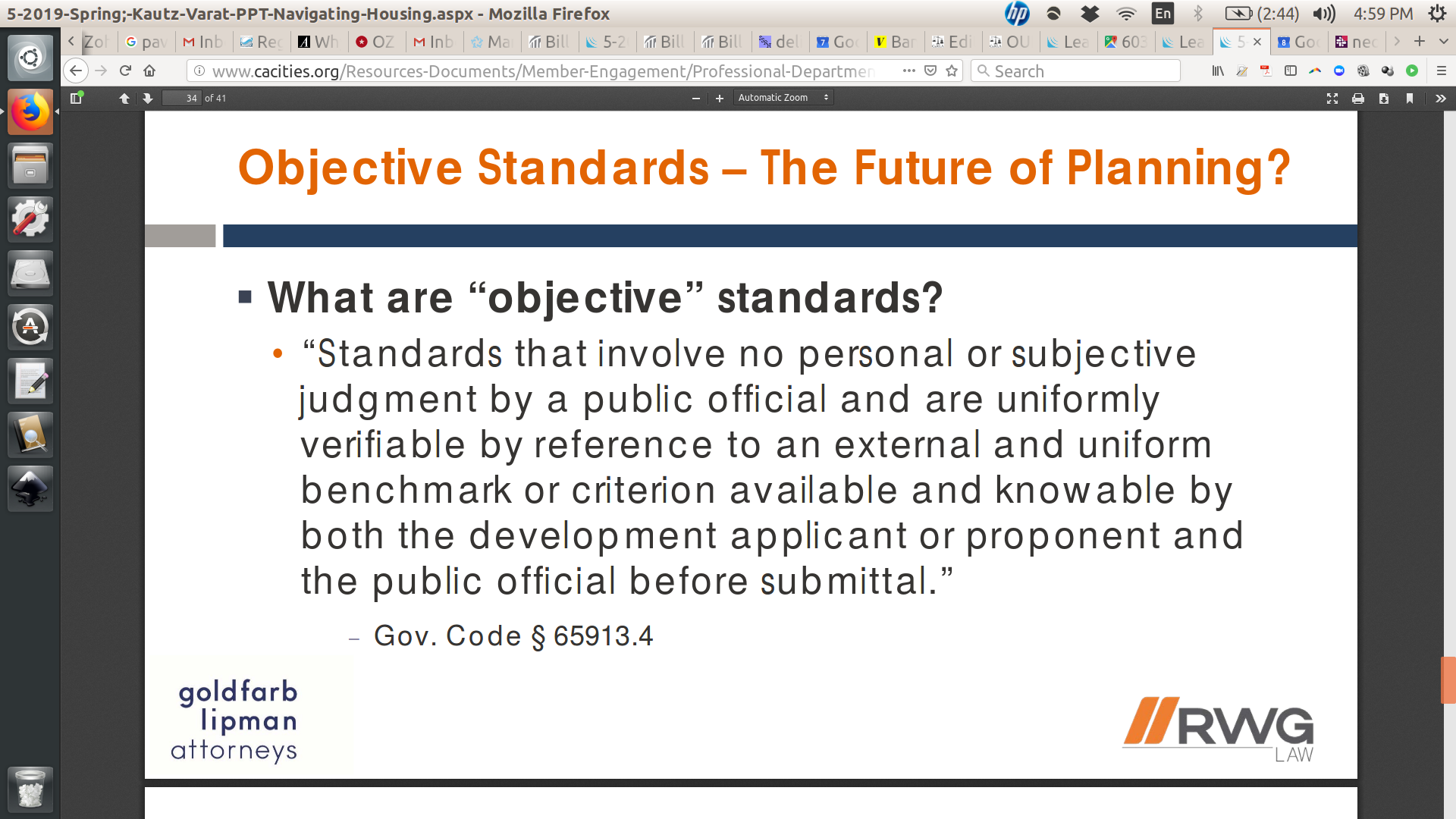… The YIMBY Era! The League of Cities is holding a conference for City Attorneys May 8-10th. One of the sessions is called “Navigating Housing Development in the New Era,” and the “New Era” is the era of YIMBYism.
Navigating Housing Development in the New Era
Paper
PowerPoint
Speakers:
Barbara Kautz, Partner, Goldfarb & Lipman
Diana Varat, Of Counsel, Richards, Watson & Gersho
This document is extremely exciting. It has two main points, (1) state laws have changed, cities have less discretion over development, and (2) the state laws are being enforced. In the introduction, the authors highlight our work, “Already, YIMBY groups have started filing litigation based on recent changes to the statute. Even more than before, city attorneys must be aware of the requirements of the Housing Element Law, No Net Loss provisions and Housing Accountability Act.”

The paper also reveals some of the attitudes and expectations that have characterized development permitting in the past few decades. The general public might be surprised to discover how alien the idea of Objective Standards are to local governments.
One section urges City Attorneys to help cities create objective standards. The new state laws only require projects comply with existing objective standards, which are often fairly broad. Therefore, if cities want to maintain local control over development, they will have to more completely describe the development they anticipate. The paper notes, “…pre-existing objective standards … likely were intended to establish minimum requirements as a prerequisite for a discretionary process.”
Planners, Planning Commissions, City Council members and active community members all over the state take for granted that each proposed project will be reviewed and vetted through a discretionary process. One of the slides in the accompanying power point asks the question “Objective standards – the future of planning?”
It’s also evidently hard to adjust to the idea that the general public has an interest in housing production. The notion that development is done for the benefit of the developer is deeply ingrained. In a section called “Practice Tips” the authors write:
If Litigation is Brought by a ‘Housing Organization,’ Understand that the Interests of the Organization and the Real Party May Not Align.
The statute allows a ‘housing organization’ to bring litigation on behalf of the developer [§ 65589.5(k)(1)(A)], so long as the organization has first provided written or oral comments to the city. (§ 65589.5(k)(2).) The HAA cases we are now defending were all brought by YIMBY organizations committed to the construction of housing of all types, affordable or market-rate. However, in the context of litigation, the interests of the developer and the ‘housing organization’ do not necessarily coincide: the developer wants a project and a settlement in a timely fashion; the housing organization wants to make new law, get attorneys’ fees, and issue a press release. This can make settlement difficult.
The authors are correct, indeed our interests and that of the developer may not align. Our interest is in seeing the most housing get built, which means if a city and developer reach an agreement to build less housing than described in the original application, we may not find that outcome to be satisfactory.
Although they grasp the main issue, the attorneys writing this can’t quite articulate why. We don’t bring litigation “on behalf of the developer”, we are suing on behalf of the general public and the future residents. Indeed we want to “wants to make new law, get attorneys’ fees, and issue a press release,” but the most important goal is to build the most housing. Strangely that goal was left off this list.
The most important section for us in the YIMBY movement to read is “Potential Citizen Responses: Initiatives and Referenda”:
In a recent USC Dornsife/Los Angeles Times survey, only 13 percent of eligible voters believed that too little homebuilding was responsible for high housing costs, and only nine percent of voters believed that restrictive zoning rules were at fault. At the same time, 69 percent wanted to retain local control rather than provide more state control over housing production.
This sets up the potential for a citizens’ revolt, through local initiatives or referenda, or even through statewide action, against the state’s insistence that cities zone for higher densities.
The risk of local or state wide anti-growth referenda is real. We live in a world where we have had robust pro-housing regulations at the state level for almost 40 years, but these regulations have been widely ignored. If we try to send in a few lawyers here and there to compel cities to build, without also showing electeds that there are well organized local residents who support building, then the laws will continue to be ignored, or worse – anti-housing residents will organize anti-growth referenda
This is why it’s essential for residents to organize, support specific housing development projects, contact their electeds to support housing and join their neighborhood associations.
Other interesting papers delivered at the conference:
Streamlined Processing of Ministerial Projects under SB 35
Paper PowerPoint
Speakers:
Patricia E. Curtin, Land Use/Public Agency Attorney, Wendel Rosen
Amara L. Morrison, Land Use/Public Agency Attorney, Wendel Rosen
General Municipal Litigation Update
Paper PowerPoint
Speaker:
Javan N. Rad, Chief Assistant City Attorney, Pasadena
